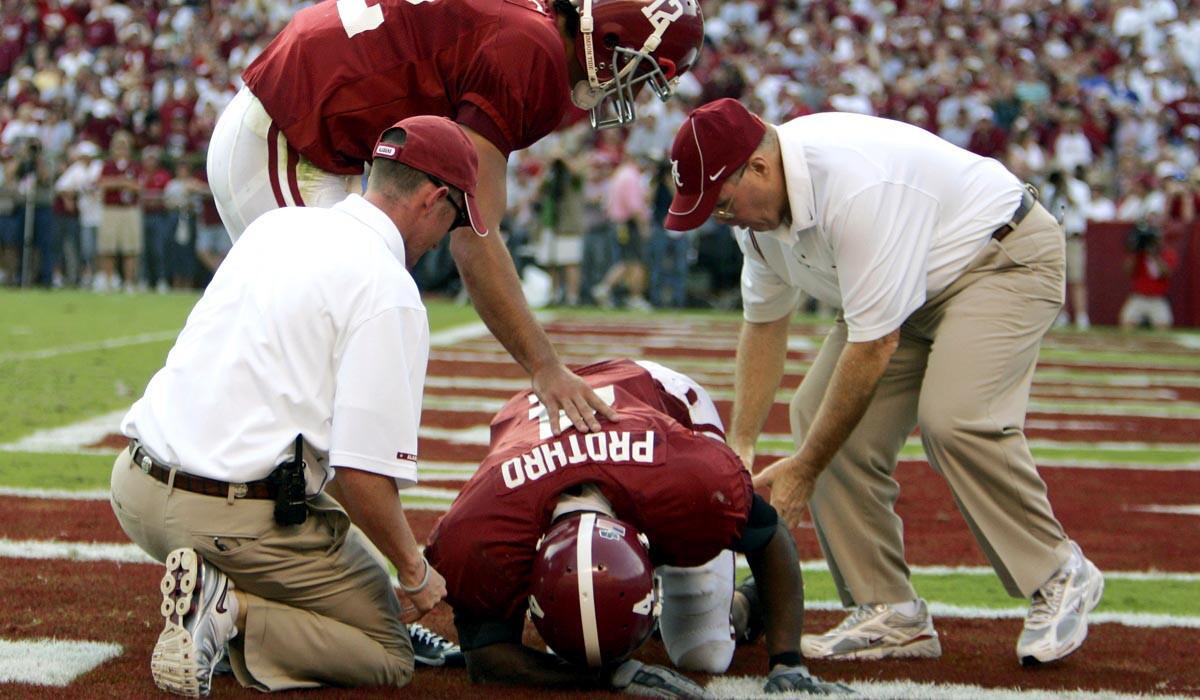Experts in NCAA antitrust case duel over broadcast rights

- Share via
Reporting from Oakland — As the antitrust trial against the NCAA wore into its fourth day Thursday, dueling experts disagreed on whether student athletes have a legal right to their names, images and likenesses that they could sell to live telecasters of collegiate games.
The class-action lawsuit filed by lead plaintiff Ed O’Bannon -- a former UCLA star basketball player -- calls into question the long-held NCAA notion of amateurism and seeks an injunction that would effectively allow top men’s basketball and football players to profit from their names, images and likenesses that are used in live broadcasts, rebroadcasts, video games, DVDs and more.
The trial opened in U.S. District Court in Oakland this week after five years and thousands of pages of filings. It has converged with a number of other key cases that also seek to harness more of the multi-billion-dollar college sports enterprise for the student athletes who drive the rising revenues.
A key issue in the O’Bannon case discussed in testimony Thursday before Judge Claudia Wilken: whether such so-called NIL [names, images, likenesses] rights even exist for purposes of live broadcasts. NCAA counsel has maintained that they do not -- that some states specifically state there is no such legal right and that national and international telecasters instead pay for exclusive access to facilities.
The NCAA’s lead expert, consultant and former CBS Sports President Neal Pilson, agreed, saying that even though “name, image and likeness” is a term that at times is included in contractual language, in his experience it was never valued separately and in negotiating billions of dollars in broadcast deals he never heard specific discussion of whether rights of individual athletes -- amateur or professional -- had been obtained.
The contracts, he testified, tend to specifically mention name image and likeness only in reference to their use in event promotions or commercial prohibitions.
Plaintiffs’ witness Edwin Desser, a consultant who was formerly the NBA head of broadcasting, took an opposing position, saying that the name, image and likeness rights of players are “at the heart” of every telecasting contract and are always conveyed -- either explicitly or implicitly.
Though their value is not separately calculated, such rights are essential to the “bundled” package of entitlements conveyed to telecasters by the NCAA and other professional sports entities in exchange for exclusive telecasting rights.
“It’s simply impossible to conceive of a sports telecast without being able to show the images of the participants,” Desser said.
The proceedings began Monday with O’Bannon on the stand and on Wednesday included testimony from former Alabama wide receiver Tyrone Prothro, another plaintiff. Both stressed that they considered themselves athletes first and students a distant second, spending the bulk of their time on their sport.
The issue of whether the continued treatment of student athletes as “amateurs” is essential to the integrity of collegiate sport was raised Thursday as well, when Pilson testified that his knowledge of broadcast viewership leads him to believe that collegiate sports would lose public support if athletes were paid for performing.
Granting them a slice of broadcasting revenue would constitute payment, he testified, adding that he believed it would as a result trigger a competitive recruiting “land rush” of young players that fans would find off-putting.
Plaintiffs attorneys jumped at the opportunity in cross-examination to show Pilson a 2010 email from former longtime NCAA policy advisor Wally Renfro to incoming president Mark Emmert that wrestled with the rising perception of “commercial exploitation” by the 108-year-old association.
“It’s a fairness issue and along with the notion that athletes are students is the great hypocrisy of intercollegiate athletics,” Renfro wrote.
When asked if that assessment changed Pilson’s view of student athletes playing for the love of the sport and as a result winning admiration from the viewing public, he said no.
“Maybe I’m naïve, but I still believe -- notwithstanding Mr. Renfro -- that the public has a different view of student athletics,” he said, “and that if we go down the road of paying student athletes all will be lost.”
The antitrust trial is being heard without a jury and is expected to last several more weeks. It alleges the NCAA and its member colleges and conferences -- by capping the number and value of scholarships and denying student athletes the ability to profit from their names, images and likeness -- is engaged in price-fixing.
Twitter: @leeromney
More to Read
Go beyond the scoreboard
Get the latest on L.A.'s teams in the daily Sports Report newsletter.
You may occasionally receive promotional content from the Los Angeles Times.











